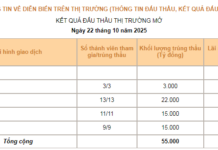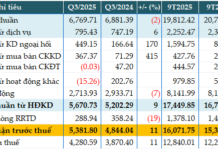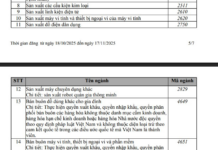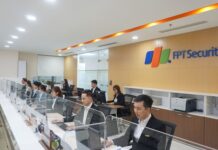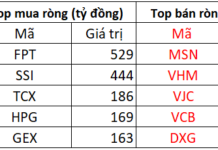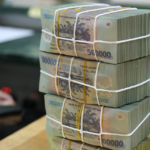Actually, in the “Project to Convert the Bien Hoa 1 Industrial Zone into an Urban – Commercial – Service Area and Improve the Environment”, Dong Nai Province has also considered supporting businesses and residents as a core task of the relocation, in order to ensure the interests of businesses and ensure social security.
Numerous Difficulties
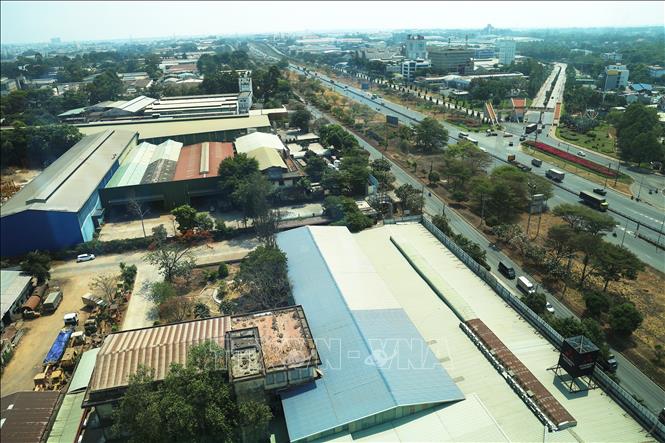
The Bien Hoa 1 Industrial Zone covers an area of 340 hectares, bordering National Highway 1, the Dong Nai River and connecting with Binh Duong and Ho Chi Minh City via Dong Nai Bridge. Photo: Hong Dat/TTXVN
According to the Dong Nai Provincial People’s Committee, there are 76 units currently leasing land and infrastructure in the Bien Hoa 1 Industrial Zone, including 6 FDI enterprises and 70 state-owned enterprises with a total of over 21,000 employees. The relocation of enterprises from the Bien Hoa 1 Industrial Zone is expected to be completed within December 2025.
In reality, the relocation process may cause many enterprises difficulties in implementing the construction of new factories, ensuring production progress; wasting time in carrying out legal procedures, environmental permits, fire prevention and fighting, etc. In addition, when relocating, equipment must also be invested to upgrade product quality according to new technologies, etc.
Included in phase 1 of the relocation, Bien Hoa Consumer Goods Joint Stock Company, the predecessor of Bien Hoa Sugar Company – a famous brand that has been present in the domestic market for a long time, is currently facing difficulties in relocation costs, machinery investment and construction. new factory. The Director of Bien Hoa Consumer Goods Joint Stock Company’s Factory, Phan Minh Nhật, shared that due to fixed investment machinery, it is difficult to disassemble, if relocated, most of them will be damaged, and only about 25% can be used, the rest must be invested. newly. Including construction, investment in a new factory, the total estimated cost is up to over 500 billion VND, which is beyond the capacity of the enterprise.
According to Mr. Phan Minh Nhật, the relocation can easily lead to the production process being disrupted due to the time needed to build a new factory, while products need to continuously appear on the market. Therefore, a long-term roadmap for relocation is needed to ensure continuous production and stabilize the product brand for the enterprise.
According to a survey by Bien Hoa Consumer Goods Joint Stock Company, up to 90% of the workers currently working at the company will quit their jobs after the relocation. Once a state-owned enterprise, after equitization, Bien Hoa Consumer Goods Joint Stock Company has many workers who have continued to work for decades. Many people have been working for over 30 years and are now approaching retirement age.
Mr. Tran Quang Thach, a worker in the chemical department, refining Bien Hoa Consumer Goods Joint Stock Company’s sugar water, shared: “I am currently 54 years old, although the insurance has paid for the surplus of years, but I have not yet reached retirement age. The company will relocate soon. Due to stable family circumstances and my old age, I can’t go far, so I will definitely quit my job. It is impossible to find a new job because no company will recruit at this age, so I and many colleagues in the same situation as me will fall into a “large” situation, quit their jobs – cannot find a job and do not meet the conditions to receive pension”.
Mr. Thach’s situation mentioned above is very common like many other elderly workers working in the Bien Hoa 1 Industrial Zone. Mr. Thach hopes that the state will have a policy to reduce the retirement age for workers who have contributed enough years of social insurance. Supporting policies need to be specific and the benefits should be clear so that employees can grasp and be more proactive in their decisions, helping to stabilize their lives.
For employees continuing to work, businesses must calculate the payment of wages during the relocation. At the same time, upon going into operation, in order to retain employees, businesses must have additional support for housing, travel, etc. to attract employees to continue working.
With the above realities, most enterprises in Bien Hoa 1 Industrial Zone face difficulties in the cost of recruiting and training new workers when old workers quit their jobs. Businesses have to pay an amount to pay for the severance pay for workers who do not continue to work for the business at the new location, the majority of employees working at the businesses are those who have worked for many years, so this cost is very high…
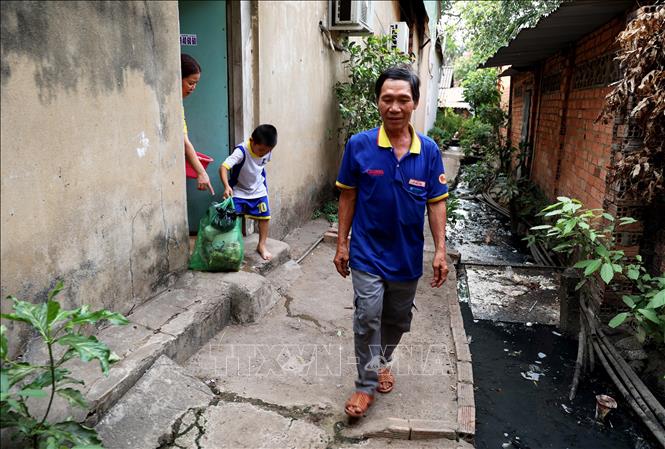
Mr. Le Huu Tung, a worker at the Dong Nai Rubber Enterprise (Casumina), has rented a house in the Cogido dormitory for nearly 20 years and said that most of the people renting houses here plan to return to their hometowns when the Bien Hoa 1 Industrial Zone relocates. Photo: Hong Dat/TTXVN
Ensuring Social Security
The Secretary of the Dong Nai Provincial Party Committee, Nguyen Hong Linh, emphasized: The implementation of the planning of any project in Dong Nai Province must ensure that the lives of people in the project area have a better life than the old location. The project to convert the functions of the Bien Hoa 1 Industrial Zone into an Urban – Commercial – Service Area, the Provincial Party Committee regularly directs specialized units and the Bien Hoa City People’s Committee to proactively advise the Provincial People’s Committee on compensation, support, and resettlement for people in the project area and workers working at enterprises in the Bien Hoa 1 Industrial Zone.
According to the Dong Nai Provincial People’s Committee, for the land area that has been cleared for households in the Bien Hoa 1 Industrial Zone according to the plan to renovate the Bien Hoa 1 Industrial Zone (1,187 households/1,509 households) about 3.2 ha, the Bien Hoa City People’s Committee has handed over to Sonadezi General Company for management since 2006, the area of households that have not been relocated (322 households/1,509 households) about 2.8 ha, the province is planning to continue relocating. Households that have not been relocated under the Bien Hoa 1 Industrial Zone renovation project have been approved for compensation and support plans since before 2008. However, at this time, due to the fact that there has not been a place for resettlement, households do not agree to receive the money and the province’s budget has not been provided, thus making it impossible to relocate the households.
The Chairman of the Dong Nai Provincial People’s Committee, Vo Tan Duc, said: The Bien Hoa City People’s Committee is currently arranging land for resettlement for 322 households (about 6 – 7 ha) and the compensation and resettlement costs for these households will actually be higher than 257 billion VND due to having to recalculate the price at the present time, inventory assets and invest in infrastructure for the resettlement area.
Regarding this matter, the Provincial People’s Committee has assigned the Bien Hoa City People’s Committee to coordinate with relevant agencies in preparing resettlement areas for people within the Bien Hoa 1 Industrial Zone, and the work will be completed in the fourth quarter of 2024.
Besides, according to Sonadezi Joint Stock Company’s plan on relocation support policy, the cost of supporting employees’ lives and stabilizing production, and the cost of training human resources is about over 1,270 billion VND, the number is about 21,448 workers. The Dong Nai Provincial People’s Committee also estimated the cost of compensation for site clearance and conversion of the Bien Hoa 1 Industrial Zone to be about 7,500 billion VND (the figure changes depending on the time of implementation).
According to current regulations, there are no regulations on the financial regime for the relocation of facilities that cause environmental pollution and facilities that must be relocated according to urban planning. Ministries and branches propose referring to current regulations, applying the current level of compensation and support, and basing on the local situation to build resolutions.
Therefore, from the “Project to convert Bien Hoa 1 Industrial Zone into Urban – Commercial – Service Zone and improve the environment”, the Dong Nai Provincial People’s Committee directed the Provincial Industrial Zone Management Board, the Department of Natural Resources and Environment, the Department of Construction, Department of








